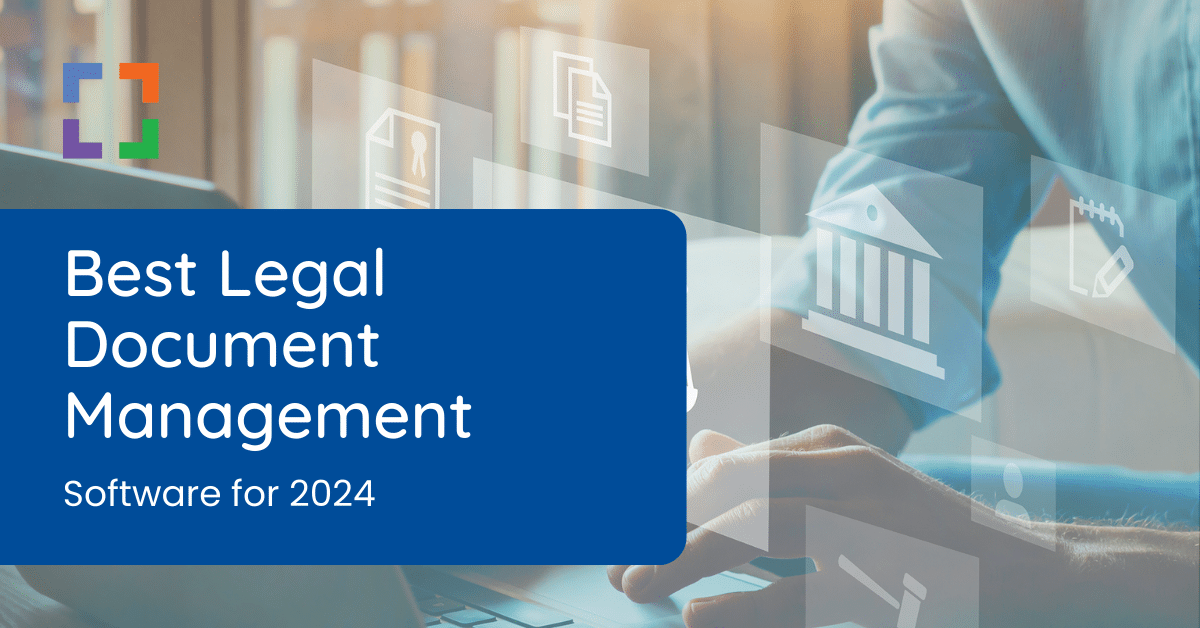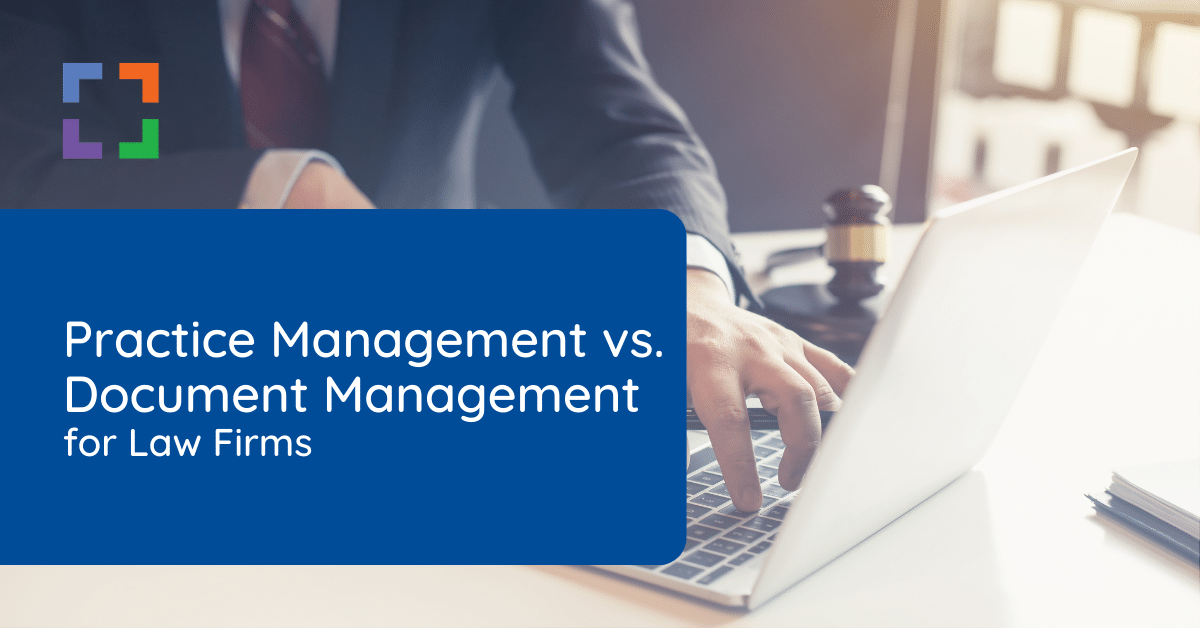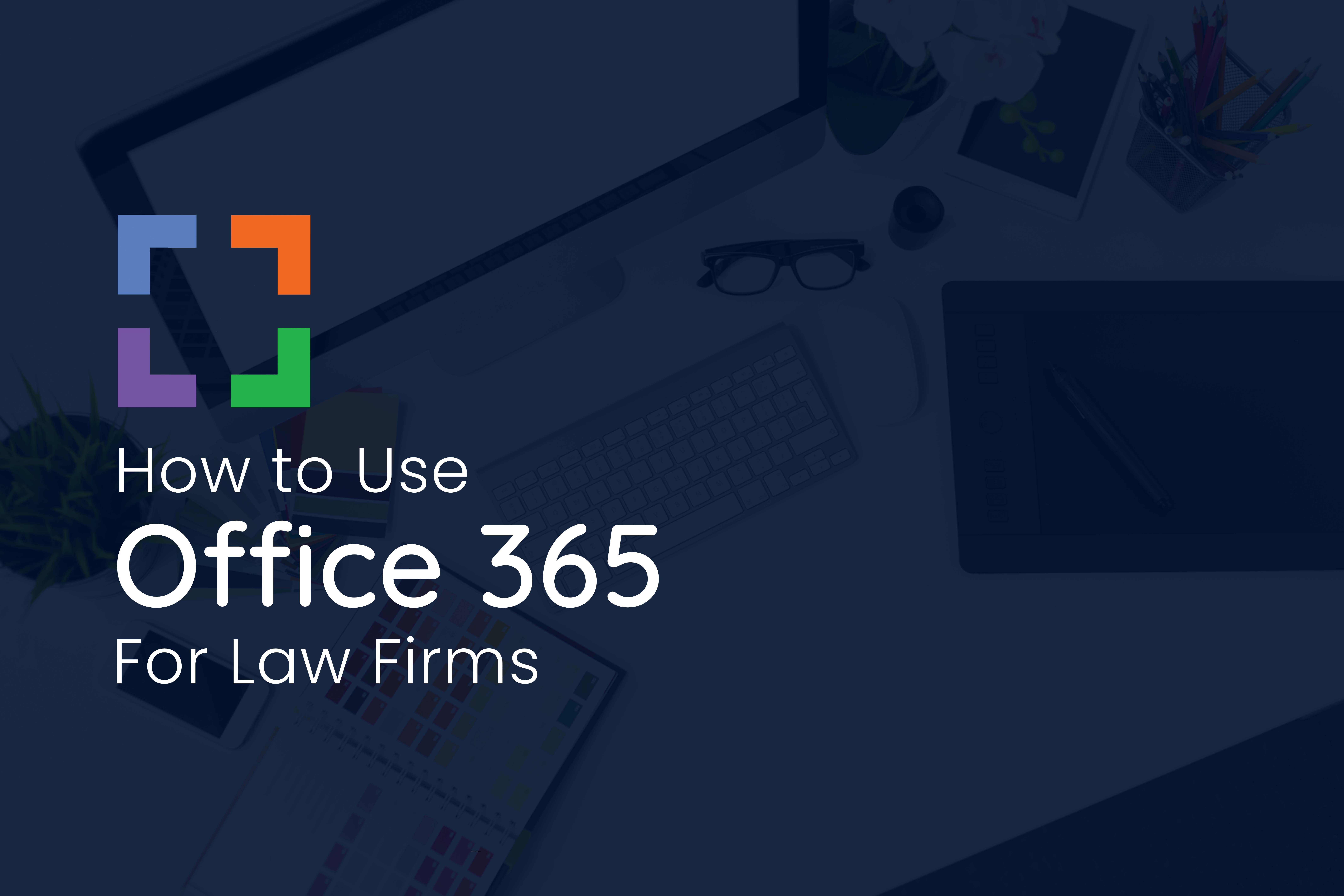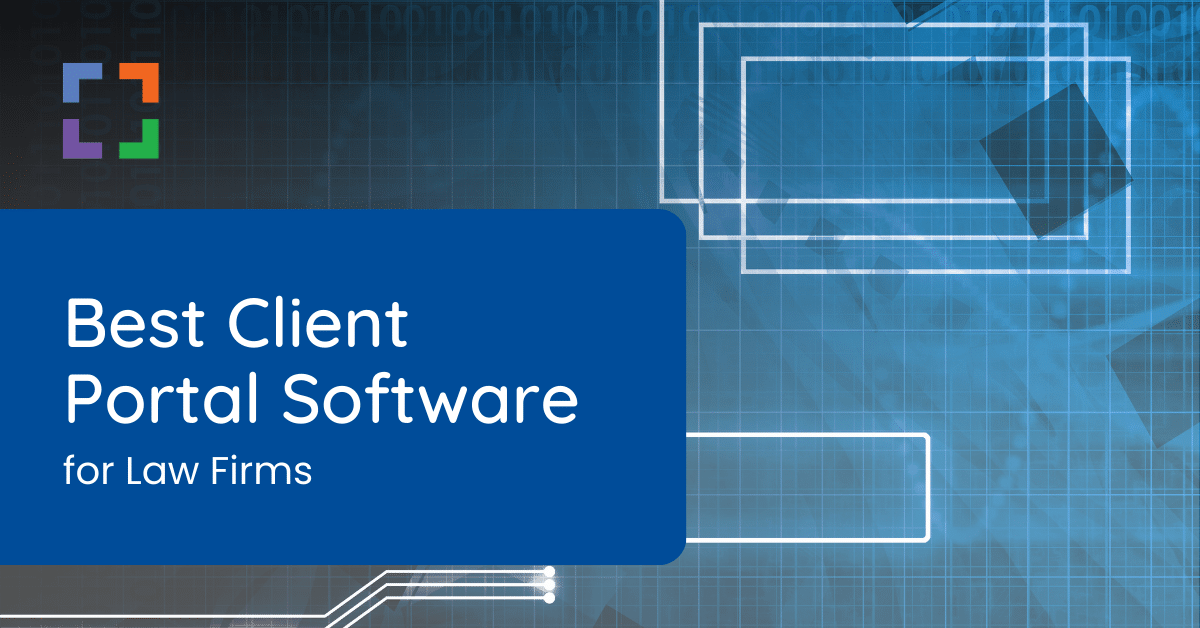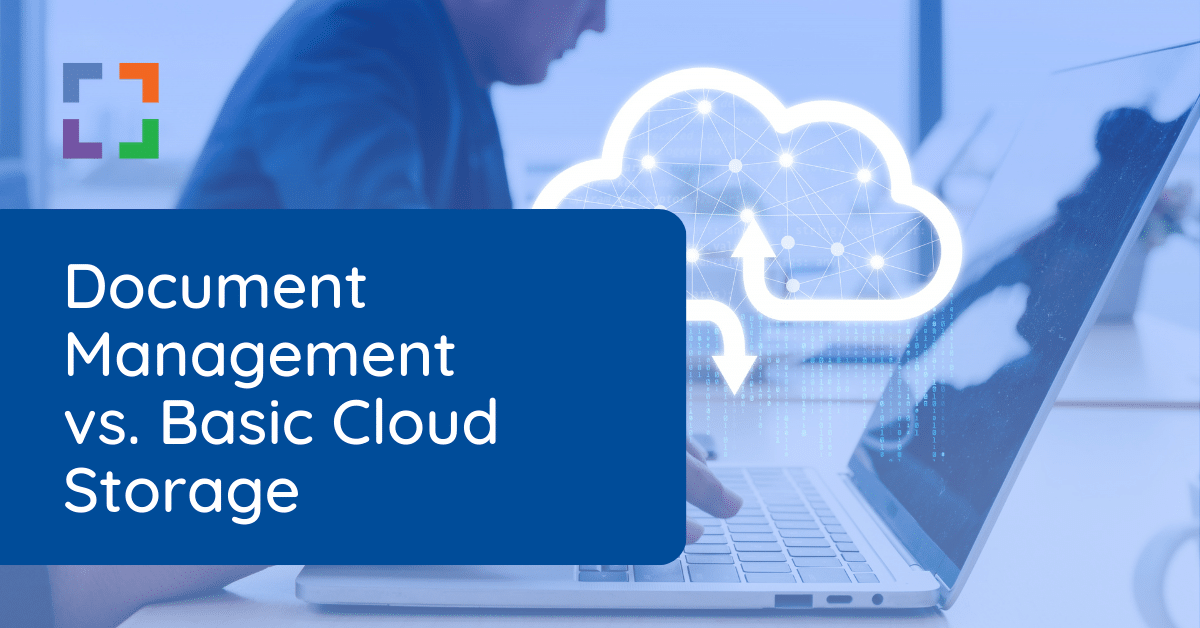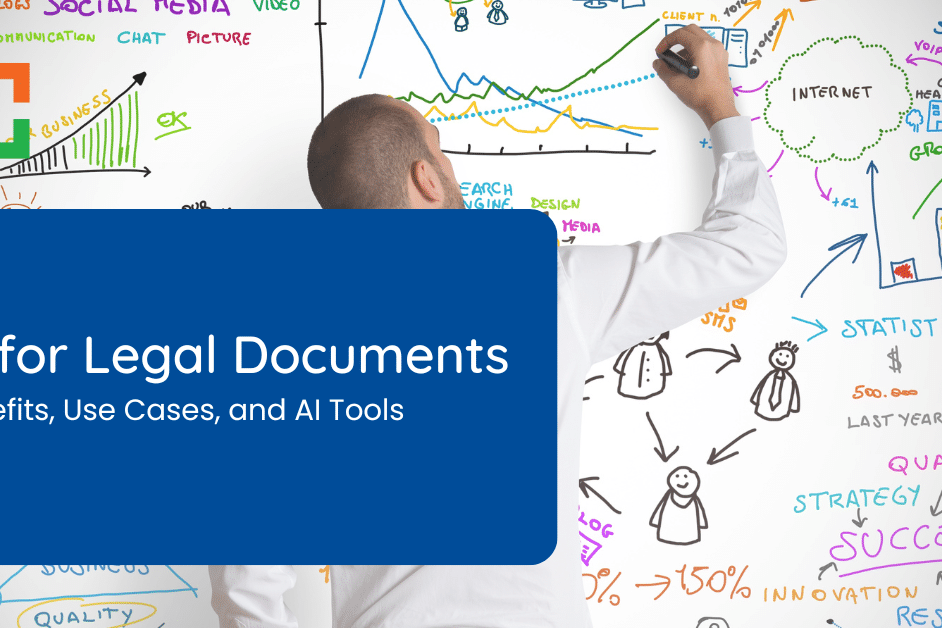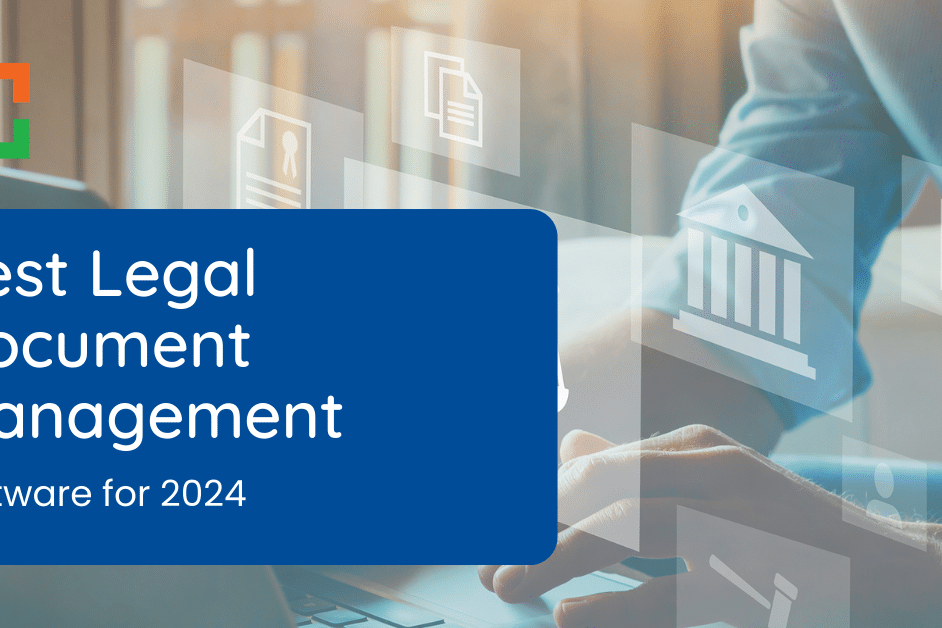Email Management for Law Firms
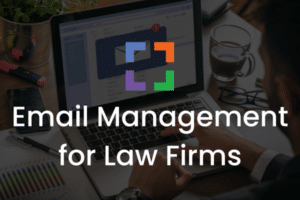
Law firms are inundated with a deluge of emails daily, making email management not just a necessity but a critical aspect of their operations.
Properly managed emails can streamline workflows, safeguard sensitive information, and enhance client relationships.
We’ll delve into the significance of email management for law firms, exploring the challenges, solutions, and emerging trends that can transform the way legal professionals handle their digital correspondence.
Deciding how to manage emails for your firm is essential. Be sure to pay close attention to seemingly minute processes, for they can either add to or subtract from your firm’s overall success and progress.
In This Article
- Introduction to Email Management
- Why Is Email Management Important for Law Firms?
- 3 Ways You Might Be “Managing” Email (And Why You Should Stop)
- Email Management Tips for Lawyers.
- What Is an Email Management System (EMS)?
- Why Your Firm (Probably) Needs a Proper Email Management System
- How to Develop an Email Management System for Your Firm
- What Is a Document Management System (DMS)?
- LexWorkplace: Modern Email Management for Law Firms
- Next Steps for Law Firm Email Management
- Frequently Asked Questions - Email Management for Law Firms

“LexWorkplace is very fast, and documents are easily accessible. Working remotely is seamless.”
Nathan Cobb
Law Offices of Nathan Cobb
See Why Lawyers Love LexWorkplace
Get Organized. Work Anywhere. LexWorkplace is modern Document & Email Management, born in the cloud and built for law firms.
The Complete Guide to Email Management for Law Firms
Managing email is simple for a solo or small law practice.
However, as your practice grows, so will the volume of documents, content and email. Simple email management practices that worked before are often outgrown as law firms evolve.
In this article, we’ll walk you through how to bring law and order to your law firm email management.
Introduction to Email Management
Email is a core component of nearly any business, including and especially law firms.
Email software (such as Outlook or Gmail) tends to be good at sending and receiving email… but often gets used by lawyers and legal professionals to handle other tasks, such as:
- Storing/sorting emails (perhaps by client, matter or project)
- Searching for emails (sent or received earlier)
As a result your email inbox becomes a defacto part of your client/case management system. The problem is: Email clients were never made to serve this purpose.
Law firms often encounter several challenges in email management:
- Inconsistencies in email storage practices can create complications and inefficiencies.
- Searching for a specific email from a client can divert time away from more productive tasks.
- Emails that aren't properly filed may lead to miscommunications with clients.
Properly managing, storing, organizing, sharing, and referencing emails is difficult but are critical for law firms. Let’s discuss what email management is, why it’s important, what you could be doing wrong, and how to fix it all.

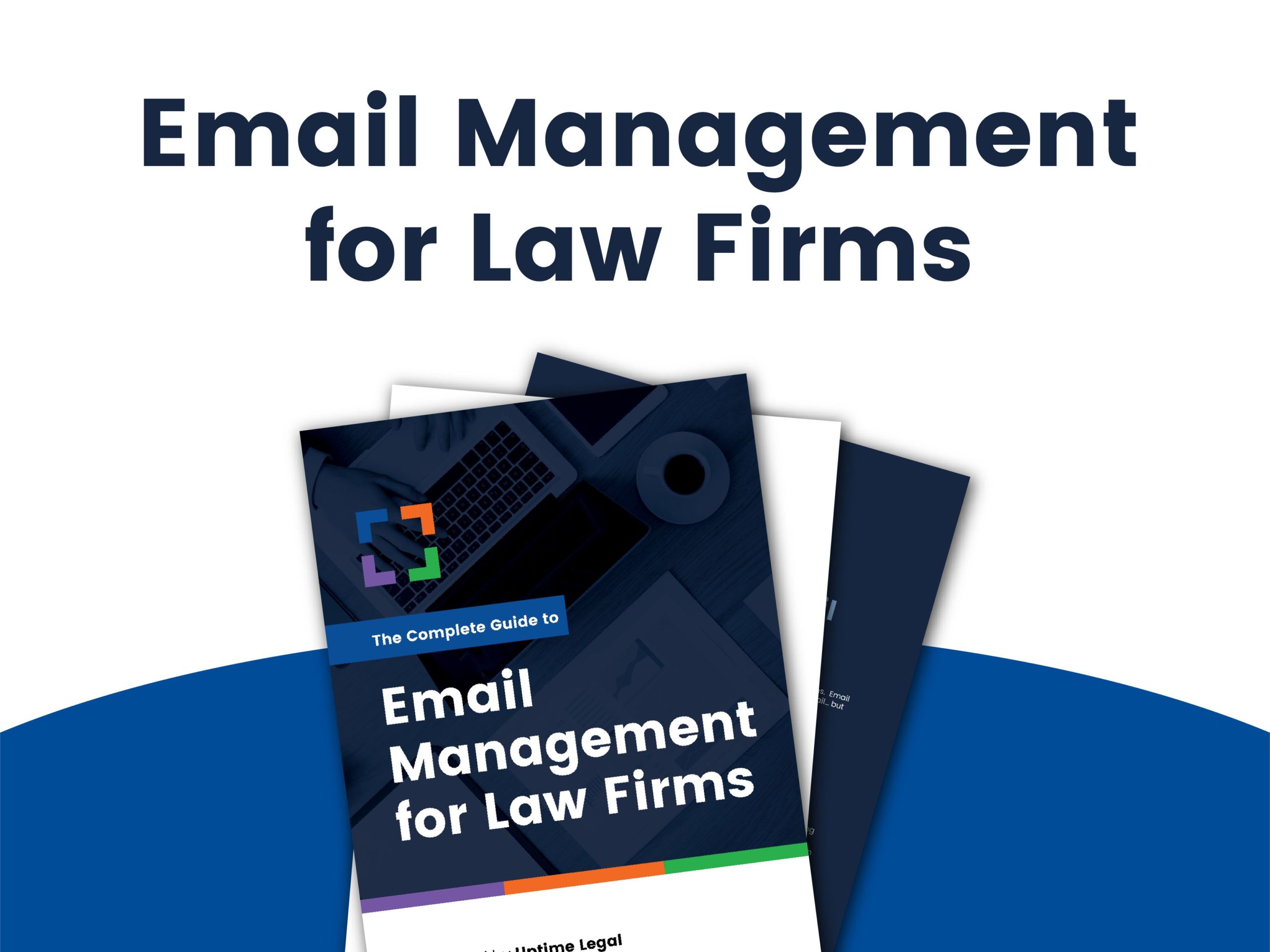
Get the Guide: Download our complete guide and bring law and order to your law firm’s email.
Why is Email Management Important for Law Firms?
According to numbers published in Adobe’s Email Usage Study, consumers spend approximately 5 hours a day checking work email. From client communications to regulatory updates, your inbox is home to critical information you need to run your firm.
Unfortunately, your inbox can quickly become disorganized.
Critical conversations can accidentally get deleted while important documents can be lost deep within threads. Searching for this information is time-consuming and, if you bill by the hour, a drain on your bottom line.
Email Management Challenges
Or: “The Problem with Email Software for Managing Email.”
Matter Information Segregation
Email lives in its own closed system such as Outlook or another email software or service.
When you’re having a conversation with a client on a particular matter, this conversation and its attachments are stored inside your email. All of the other matter-related information, including documents, case notes, and matter data will be somewhere else.
Unfortunately, this segregation of information results in inefficiency, wasted time, and potential for serious mistakes.
Not Centralized, Not Shared
Are there other team members inside your firm working on the same case? If so, you all might be conversing with clients or colleagues via email regarding the case.
While you might be great at saving emails to a specific Outlook folder, the other people working on this matter may not know you’ve spoken with a client at all.
Email, on its own, is completely decentralized, which leads to a lack of transparency and (often) duplicative work.
Individualized Organization
With standard email, you are left to your own devices when it comes to developing a system for keeping your emails organized and sticking to it.
While Outlook and Gmail may give you tools such as folders and tags, it’s up to you and your team to use them.
And even if you’re diligent about perfectly organizing emails by folder, tags, or both: there’s nothing ensuring the rest of your team does the same.
Search Difficulties
Searching email with built-in email software is hit or miss. For example, the Outlook search index is prone to breaking which can make searching slow or impossible.
If you need to search your inbox for a client document, it may take valuable time to do so. Law firms require rich search features to ensure every file pertaining to a specific keyword, whether contract or simple client email, shows up.
Standard email software can’t deliver on this need. What’s more, oftentimes you may not be sure if the thing you’re searching for is in an email or a document, and you’ll need a way to search across both.
OCR Challenges
Optical character recognition (OCR) is critical for firms that frequently use PDFs.
If you’ve ever emailed a scanned PDF document, opened it, and noticed you can’t select, highlight, or copy any of the text, you know the importance of OCR. This process converts the scanned document into a full-text document.
If a document isn’t OCR’d, it’s not easily editable and won’t be found in search. Unfortunately, without the right email management, you and your team will need to manually OCR every PDF file yourself, leaving room for error and missing documents.
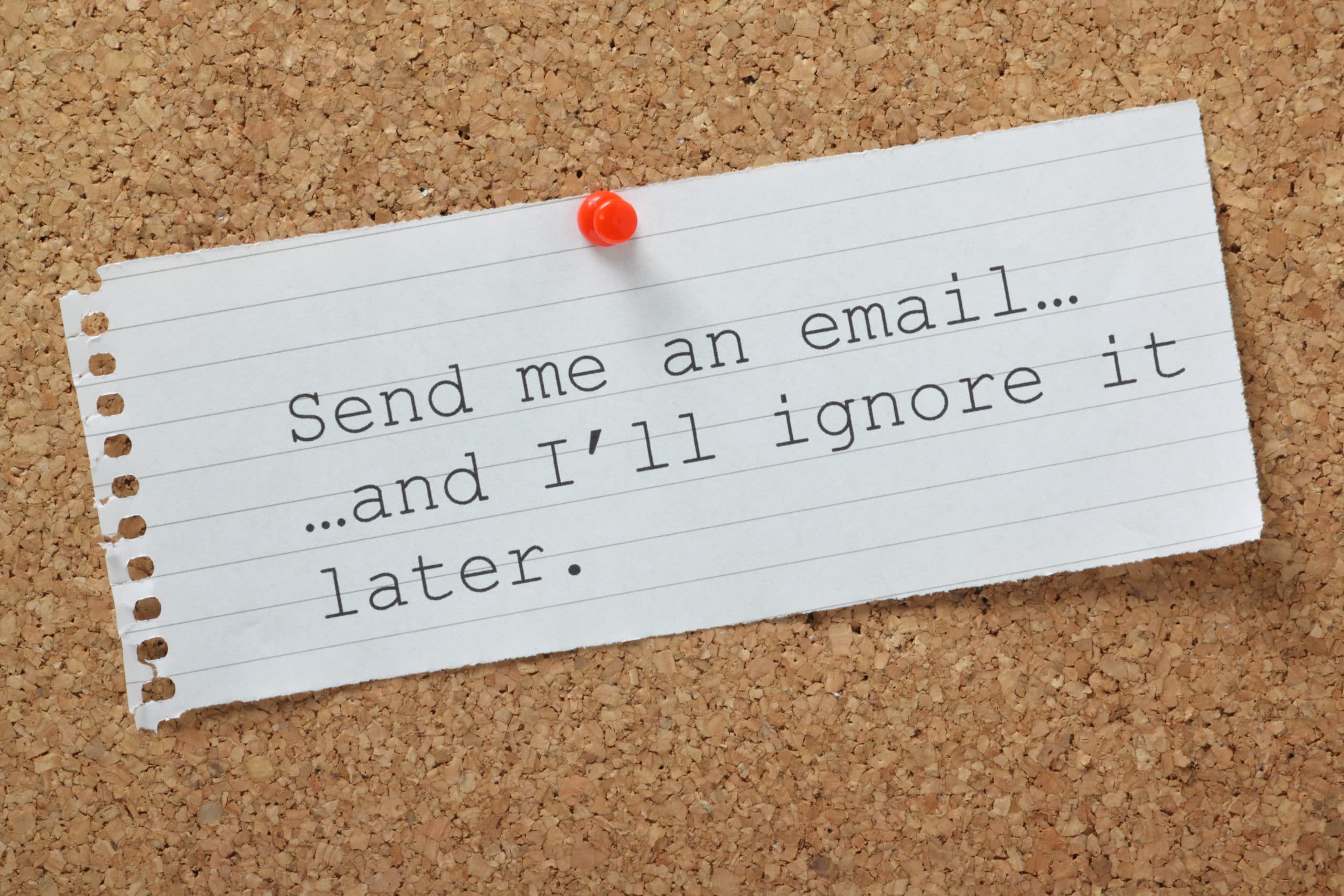
Luckily, there are tools available to you to help you meet these challenges head-on. Specifically: Email Management.
Email Management functionality is a subset of Document Management functionality, often found in a Document Management System (DMS).
LexWorkplace Top Features
Cloud-based Document Management
- Automatic, Integrated OCR
- Secure Cloud Storage
- Client/Matter-Centric Org
- Full-Text Document Search
- Secure Client Sharing
- MS Office Add-In
- Email Management
- Windows + Mac Compatible
Related – Best Document Management Software for Law Firms: For law firms, managing documents optimally is key to success and progress. Learn more.
3 Ways You Might Be “Managing” Email (And Why You Should Stop)
“But wait, I do store my emails and it’s been good so far.” We hear you.
But after speaking with so many attorneys through the years, we know that most email storage methods are simply subpar when it comes to true email management.
Let’s discuss the 3 methods law firms typically use to store their emails and why they simply don’t work.
1. In Outlook With Folders
Perhaps the most common way of “managing” emails is simply using folders inside Outlook. It requires each individual team member to manage their own emails inside their own inbox. We’ve found this to be the default way for most firms.
Using this method, new folders are typically created for each new client or new matter. Unfortunately, this leads to all emails now being decentralized as each member of your team will have their own separate folders.
They’re not shared with the rest of your team and are often duplicated, leading to a disjointed and fragmented mess.
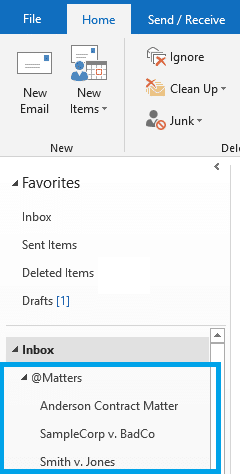
Furthermore, all of the emails are now saved inside Outlook or Gmail while other documents are saved elsewhere in a separate system. Using this method, locating all matter-related information is a tedious process that often results in mistakes and unnecessary frustration.
2. Saving Emails to PDF
Some law firms try to avoid disparate systems by saving all emails to PDFs and then storing them with the rest of their legal documents. Unfortunately, saving documents to PDF is a clunky and time-consuming process.
And that’s if you and your team remember to save each individual document from every email in the first place.
3. Saving Emails to Practice Management Software
Some Law Practice Management applications have rudimentary email management, allowing you to save emails to a matter, or CC/BCC a special address to file a copy of an email in your case management software.
While doing this is better than trying to use Outlook folders to manage email, we find that Document Management Systems are almost always better-suited for managing email. Most case management apps, even if they allow you to save emails to each matter file, often lack the ability to search through documents and emails effectively.
Indexing is clunky and makes finding your critical documents tough. And, in a busy law firm, even a few minutes spent searching for a single file is too long.
Related – Practice Management vs. Document Management Software: Do they sometimes share features? Sure. However, they’re not the same.
Practice Management Software (Usually) Isn’t Enough
You may also have practice management software you use to help organize your matter materials. That’s a good thing. Plus, it may even have a few email management features. For example, they may allow you to copy an email to a case within the case management system.
However, practice management software isn’t enough for most firms. The email management features are typically rudimentary. The email integration process is often clunky and requires you to set up a clumsy email forward to get emails into the system.
And these systems often copy the content of an email rather than the full email in its entirety, leaving critical information behind.
Want to Learn More about Document Management Software?
Get in Touch!
Email Management Tips for Lawyers
Lawyers often navigate through a sea of emails, each demanding attention and action. Mastering the art of efficient email management can lead to a more organized and productive practice.
Here are some consolidated tips for lawyers to enhance their email management:
Delegate Effectively and Stay Updated
Efficient delegation of emails and tasks ensures even workload distribution among team members.
Keeping abreast of new tools, technologies, and best practices, including the benefits of a DMS like LexWorkplace, ensures you are utilizing the best tools available.
Emphasize Data Security and Foster Team Collaboration
Ensuring secure handling of sensitive information and utilizing collaborative platforms for internal discussions are crucial.
A DMS can provide an additional layer of security and facilitate centralized discussions and document sharing.
Minimize Distractions and Aim for Inbox Zero
Regularly declutter your inbox from non-essential newsletters and notifications, and aim to archive and organize emails regularly.
A Document Management System (DMS), like LexWorkplace, can archive older emails while retaining easy access to them.
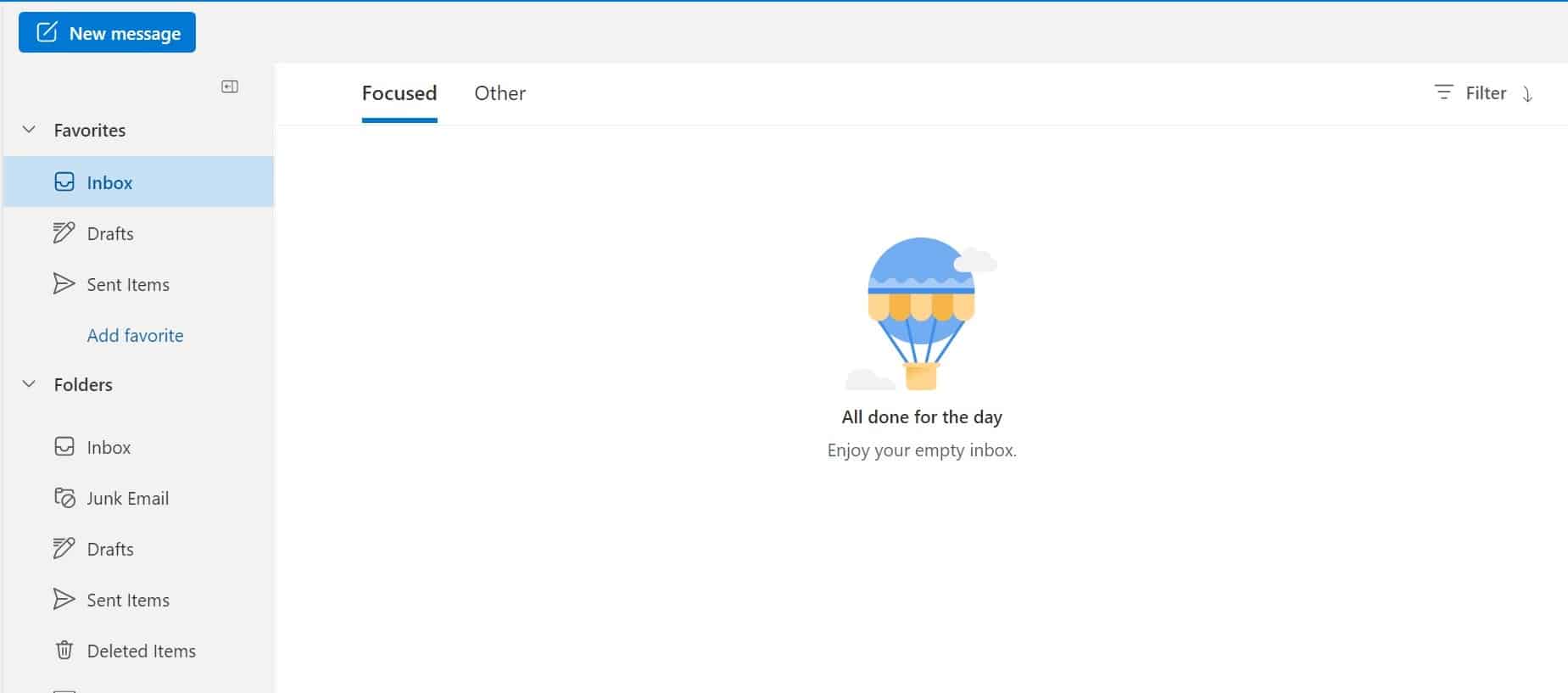
Leverage Templates and Schedule Dedicated Email Time
Save time by creating templates for common responses and allocating specific time slots in your day for managing emails.
An EMS can store these templates and facilitate focused email management, enhancing productivity.
Prioritize, Categorize, and Optimize Your Inbox
Sorting emails based on urgency and relevance, and implementing rules to sort incoming emails into appropriate folders, can streamline your inbox.
An Email Management System (EMS) can automate these tasks, subtly enhancing efficiency and organization.
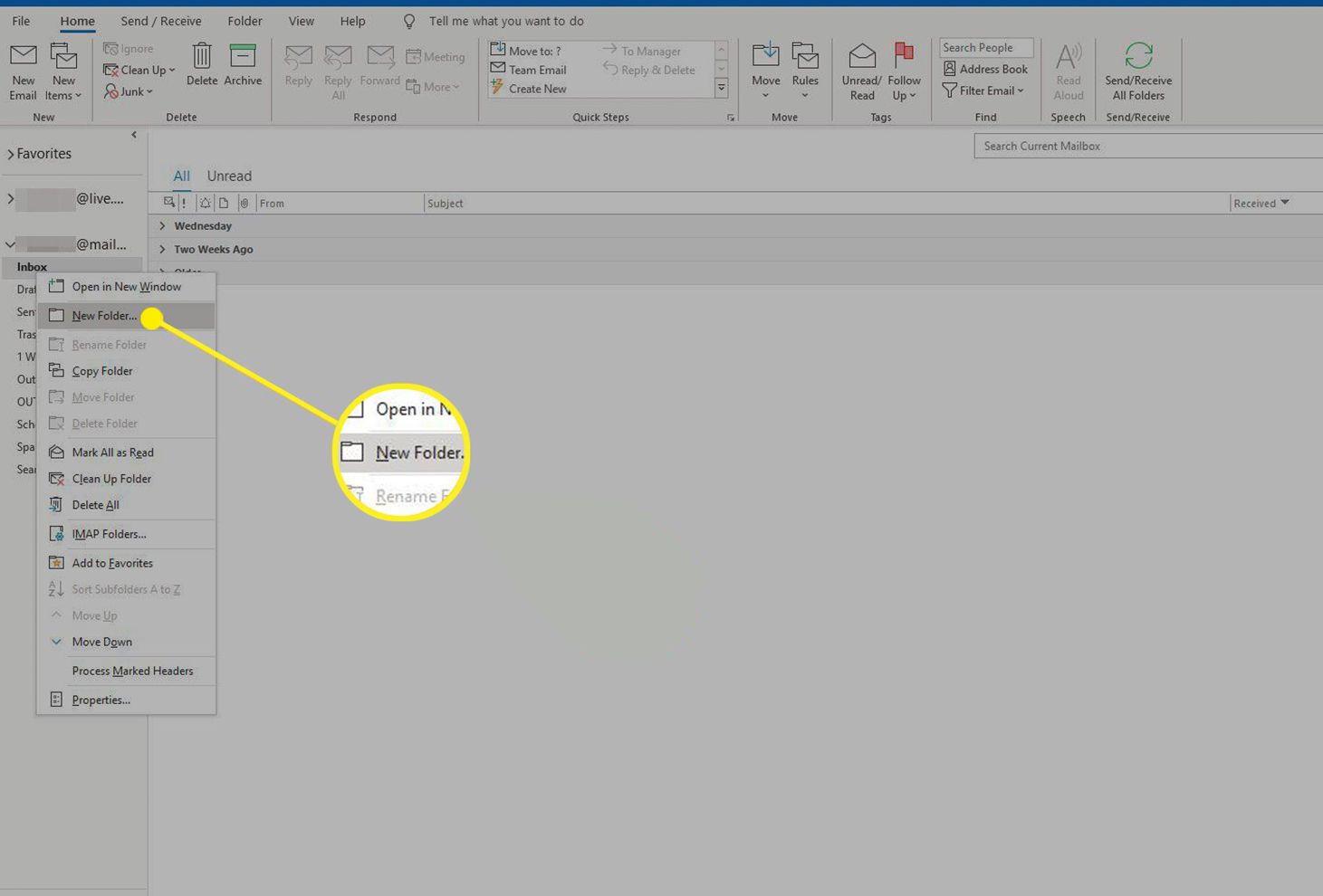
By adopting these consolidated tips and considering the integration of an Email Management System/Document Management System, lawyers can ensure a harmonious balance between efficient communication and organized document handling.
The integration of systems like LexWorkplace can lead to a more efficient and productive legal practice, showcasing the value of modern solutions in a dynamic professional landscape.
What is an Email Management System (EMS)?
The bottom line is this: “default” tools such as Outlook, Gmail, or even your practice management software are often ill-suited to manage matter-related emails in a central, organized way.
Law firms should implement an email management system (EMS) as part of their company protocol. An EMS encapsulates your company’s policies and procedures with handling emails and other data.
An EMS helps law firms streamline the way they store, organize, manage, and find emails. For law firms, using an EMS that’s native to a DMS will save emails to each matter, alongside other files and content related to a specific client or case.
Again, an Email Management System is a native function, or set of processes, within a broader Document Management System (DMS).
LexWorkplace Success Story
See how one law firm uses LexWorkplace to organize their documents and streamline their practice.
Book a 15-Minute Demo
How Does an EMS Work?
By default, your company’s EMS works by utilizing with your existing email software such as Outlook. As you sift through your email, the management processes tell you how to save emails to a matter or client from the same screen.
Typically, an EMS is best utilized as a key, integrated aspect of a document management system (DMS) because the DMS will be set up with law firms in mind. We’ll detail this a bit later.
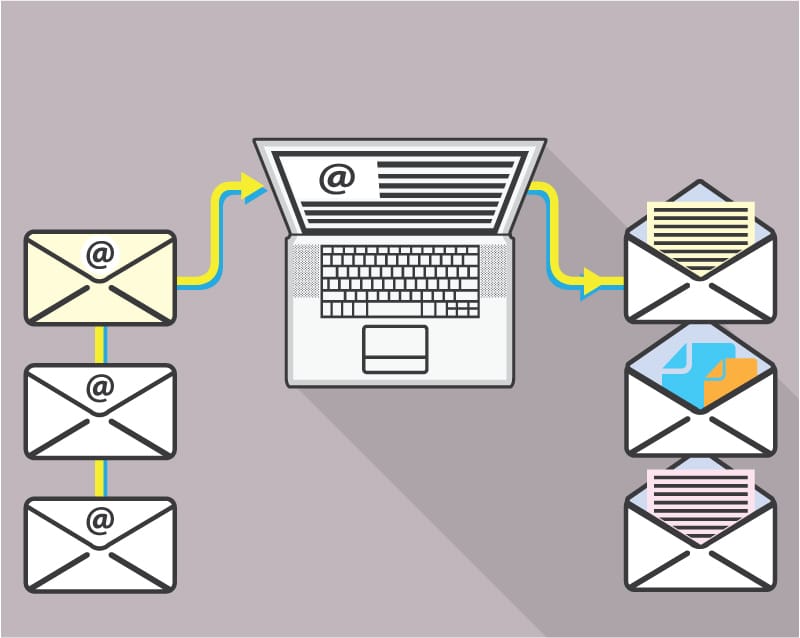
Features of an Email Management System
To get a true picture of what an EMS does when compared with default methods, it’s best to take a look at the features.
Any solid law firm email management system should consist of:
Storage
Determining where your firm stores its emails, documents, and other files transmitted through email is crucial.
This includes considering whether your firm uses on-premise servers, cloud storage, or a hybrid solution. The choice of storage solution can impact the accessibility, cost, and scalability of your data management.
Email Organization
Understanding the folder structure that your firm uses to organize files is essential.
A well-thought-out organization system can include categorizing emails by client, case, or date. Implementing a consistent and logical structure ensures that every team member can quickly locate and file emails, enhancing overall productivity.
Search and Retrieval
Efficiently finding emails can be a complex task.
The search functions in place, such as keyword search, date range filtering, and tagging, play a significant role in determining how quickly and accurately you can find what you're looking for. An advanced search system can save valuable time and reduce frustration.
Security
For law firms, having robust encryption and comprehensive security measures is paramount.
This ensures that sensitive information, such as client data and legal documents, is protected from unauthorized access and potential breaches. Security measures can include multi-factor authentication, access controls, and regular security audits.
Collaboration
Exploring how your firm collaborates through sharing and mutual access to files is vital.
Effective collaboration tools can allow real-time editing, version tracking, and commenting on documents. This ensures that team members can work together seamlessly, even from remote locations.
Archiving and Backup
Data can sometimes be lost, corrupted, or become unusable.
Implementing proper archiving protocols, such as regular backups, data redundancy, and clear archiving policies, is essential to ensure data integrity and availability when needed.
Integration
Law firms often rely on legal software for case management, billing, and other tasks.
Seamless integration with your email management system can streamline workflows, reduce manual data entry, and ensure that no information is missed or lost during communication.
Ease of Access
Having easy and straightforward access to emails and files is about more than just convenience.
It ensures that team members can retrieve the information they need promptly, leading to a smoother workflow and a more positive user experience. This can include mobile access, user-friendly interfaces, and quick navigation features.
Why Your Firm (Probably) Needs a Proper Email Management System
Centralizes All Matter-Related Data
An email management solution (especially when coupled with a document management system) will keep all of your matter-related data together in one place.
For example, LexWorkplace, a full law firm DMS, organizes case documents, emails, and notes into tabs for easy access.
When you need to find a file, it’s readily available, boosting your productivity and eliminating mistakes.
It's Easier to Organize Your Files
An email management system will take the guess work out of organizing.
When emails are systematically categorized, tagged, and filed, it becomes significantly easier to locate and retrieve the information you need.
This not only saves time but also reduces the risk of misplacing important documents. An organized email system can automatically sort incoming messages based on predefined criteria, ensuring that all related files and communications are grouped together.
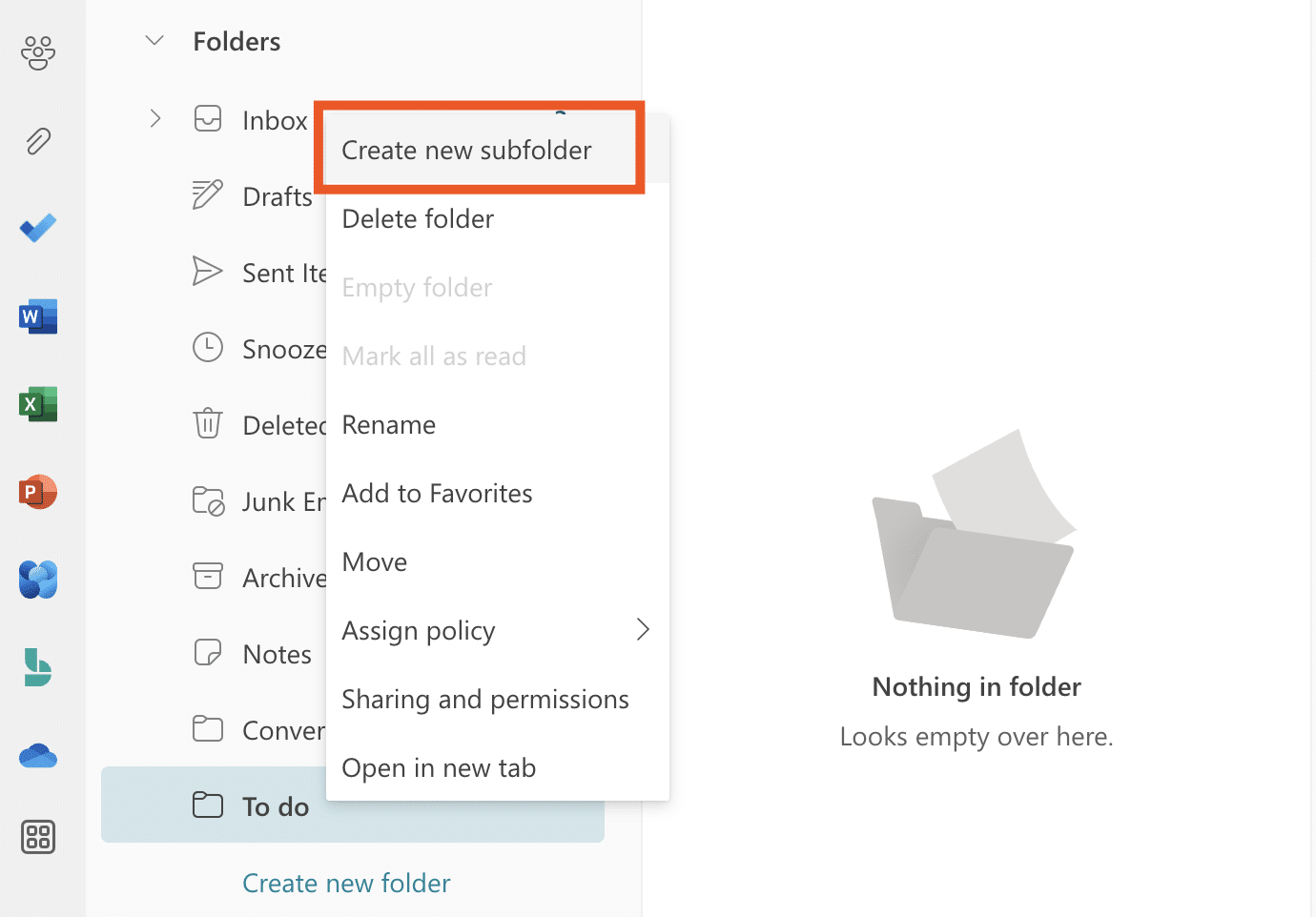
Simplifies Sharing of Matter-Related Data
Email management enables you to store emails in a way that’s much more accessible.
When you save a relevant email to a specific folder, you can find the emails and other related files quicker and easier.
This ensures everyone is on the same page which means you can better serve your clients and improve efficiency.
Enables Fast and Efficient Search
In a developed email management system, indexing is streamlined.
This is particularly beneficial in a fast-paced legal environment where time is of the essence and swift access to client communications or case-related documents is crucial.
An organized email system enhances productivity by transforming a potentially time-consuming search into a swift and seamless process.
By way of example, LexWorkplace allows you to save an email directly to a specific Matter (via its Outlook add-in).
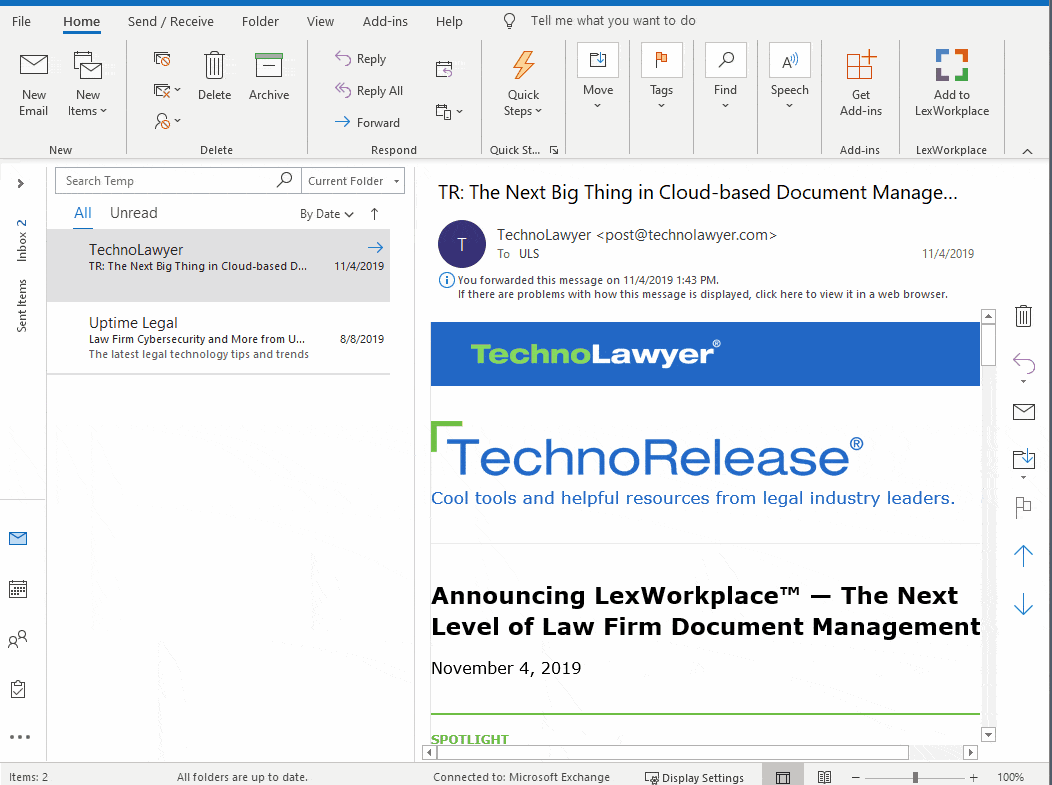
Next, you can further organize emails within a matter into subfolders, just like you would within Outlook.
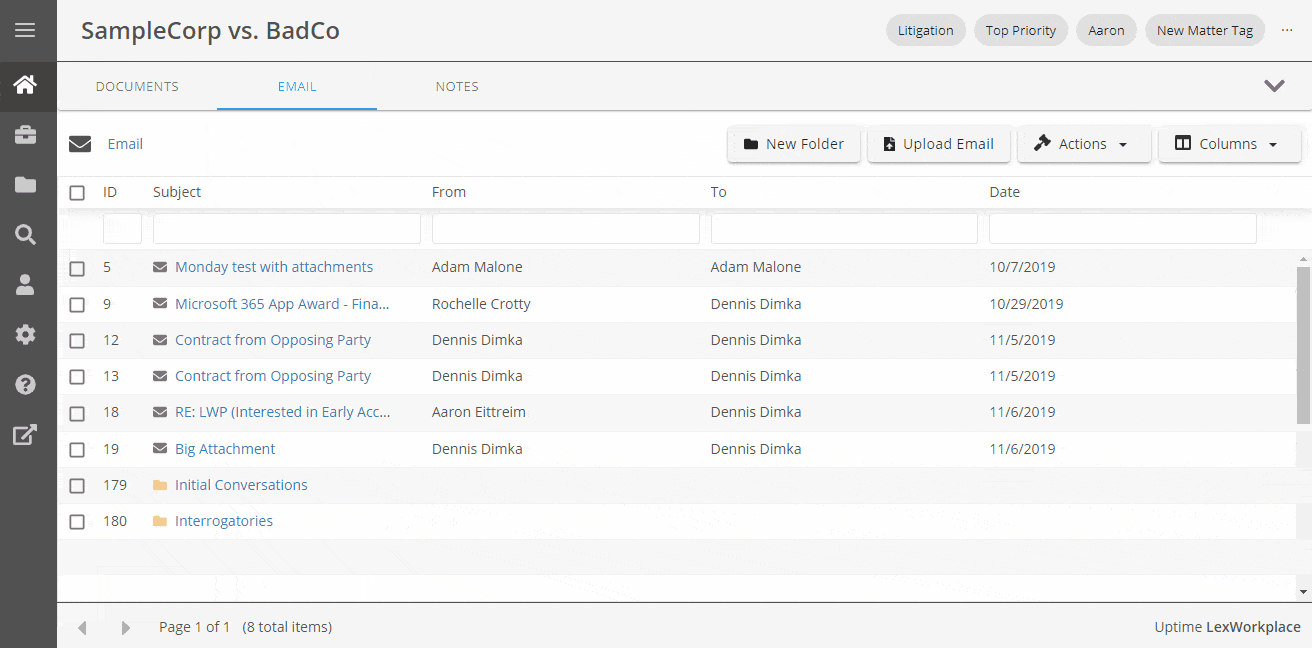
Now, all important emails for this matter are (a) accessible to your entire team, and (b) live alongside documents for the same matter.
How to Develop an Email Management System for Your Firm
Whether you’re ready to implement an email management system or want to upgrade your current system, there are some basics you should know first.
Develop an EMS That Works With Your Current Tech Stack
First, you’ll want to develop an EMS that works with your current tech stack. Hopefully you already have some system in place that you can refine with these guidelines.
If you do not, you may need to overhaul your current system to include more pragmatic features. Keep in mind that any new system will require some training as well. Nonetheless, you will need to keep your current email client in mind.
For example, if you use Outlook and other Microsoft tools such as Office 365, you’ll want an email management system that integrates with Microsoft tools. If you use Gmail, it should have Gmail capabilities in mind.
Point blank — if the EMS won’t work with your current email client, you must find another option. This is a critical function for your EMS to work properly.
Related – How to Use Office 365 for Law Firms: Office 365 is a valuable suite of tools. Read to learn how to apply the suite for law firms.
Integrate, Integrate, Integrate
The next step is to integrate your EMS with your email service. Don’t let this step scare you. The good news is that developing your firm’s EMS should work well if you have kept the particular email client you use in mind.
A quick note: While developing your EMS, it’s important to consider which email client offers support. If you need help during setup or something goes awry when trying to use your EMS on a random Tuesday afternoon, you’ll want someone to reach out to for help.
Organize Folders by Client or Matter
After integration and setup, you’ll want to start organizing your emails.
We recommend starting by creating folders for each specific client or matter. Go ahead and set these folders up for your active clients soon after you integrate so you can get a jump on your email management.
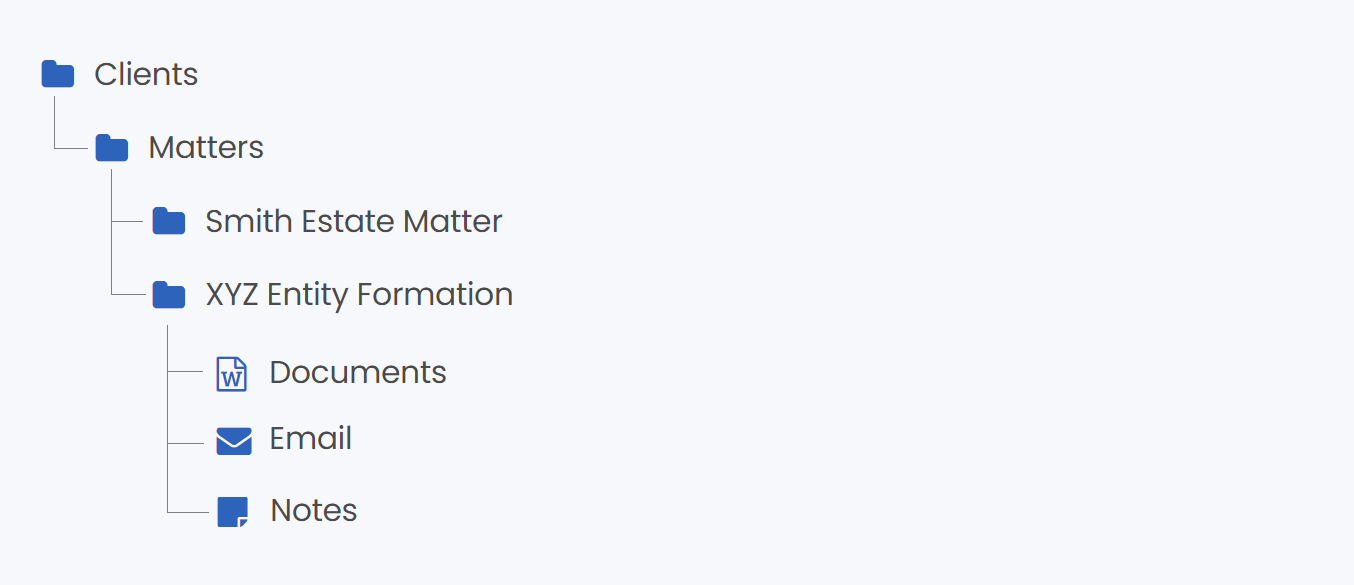
As you take on new clients, you can simply add new folders. Most EMS options will allow you to do this right inside your email. This makes it easy to organize from the email instead of going in and out of multiple tools.
Related – Best Client Portal Software for Law Firms: Client portals help streamline your practice while improving how your client communication. Learn more.
Migrate Stored Emails to Your EMS
If you’re currently storing your emails another way, you’ll want to organize those files using your new EMS.
This ensures you’re able to access all files in the exact same way. While this step can be tedious, having your old emails and files in this system will give way to better organization moving forward.
Consider Using an Email Archive Tool
Want another layer of storage to ensure you never lose an email file? Using an email archive tool is a great option. These tools store a copy of every email ever sent or received to or from anyone in your law firm. If you forget to save an email or you accidentally delete one, these tools will stand in the gap.
There are various email archive options out there, including Microsoft Exchange Online Archiving which works seamlessly with Outlook.
If you’re reading these steps and thinking, “There must be another way”…
There is.
Document Management Systems, such as LexWorkplace, come with EMS as a functionality, so organizing your emails and files takes minimal effort comparatively.
See the main features compared below.
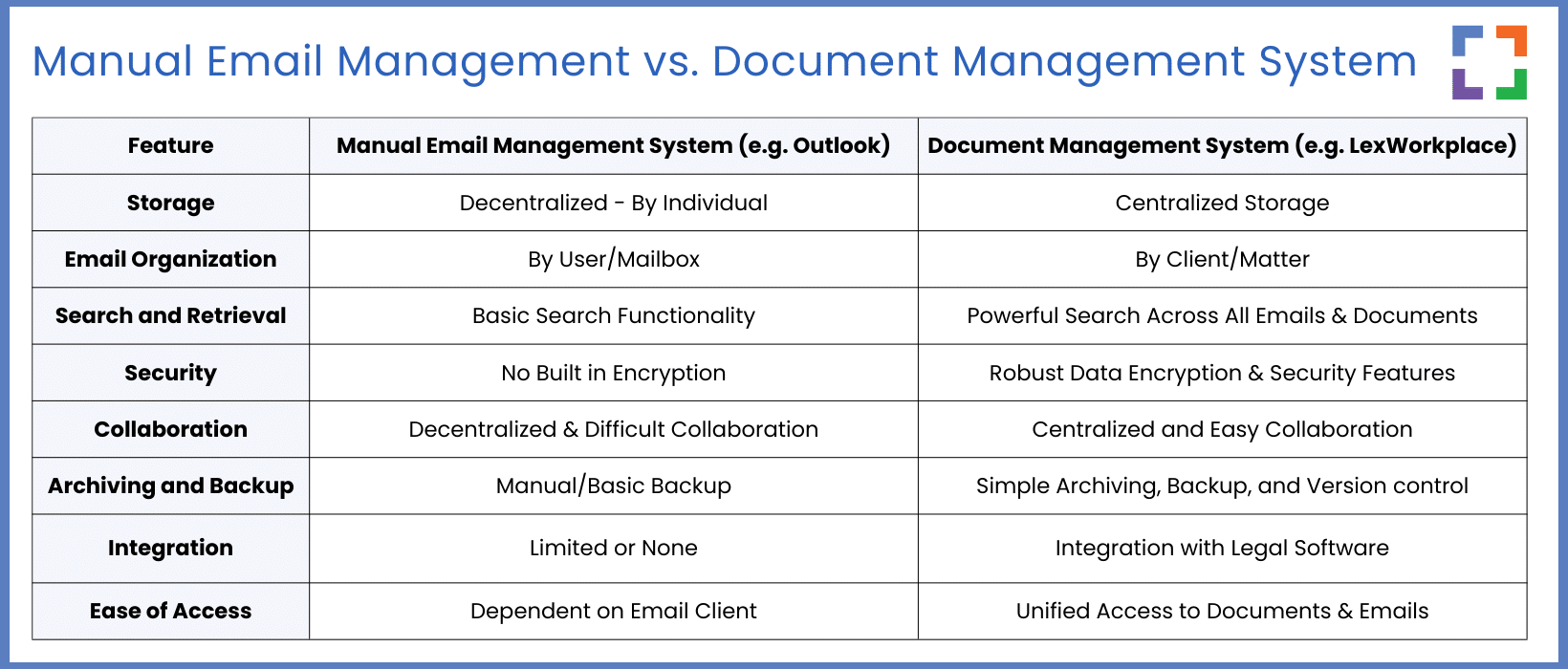
With these features compared, let’s discuss…
What Is a Document Management System (DMS)?
While some solo or smaller firms can benefit from an EMS, bigger teams especially require more.
For these firms, we typically recommend that you instead opt for a document management system (DMS) that delivers email management as a key feature versus a standalone email management system.
A DMS is a tool that not only stores your law firm’s emails and documents but provides robust tools to find, organize, and manage them. A DMS can be either cloud-based or on-premise (although we don’t recommend going that route).
We’re not talking about OneDrive, Google Drive, or Dropbox here. We also don’t mean your S: drive or your basic practice management app.
A law firm DMS is a complete management system designed to help you keep track of every critical file your firm needs to complete your important work.
Related – Document Management vs. Basic Cloud Storage: Though there is some overlap between the two, knowing which one you need is essential knowledge.
Features of a Document Management System (DMS)
Of course, a DMS will include robust email management features such as the ability to save emails to specific matters straight from your inbox.
However, there are other features included inside a DMS that will greatly benefit your firm:
- Full File Storage: A DMS will store all of your documents, not just emails. This includes everything from client intake documents to contracts and beyond. A cloud-based DMS is the best choice as it enables you to access your files from anywhere.
- Document Profiling: You can apply attributes to your documents, including document classifications, types, and tags for easy indexing. Plus, a DMS will give you the ability to add notes to documents for additional information.
- Full-Text Search: You can search across documents and email. Search results will contain everything from filename to metadata and document content.
- Document Check-In/Check-Out: To avoid you making changes to a document at the same time as another member of your team, you can check documents in and out using a DMS. While you’re in the document, no one else can edit it as it’s locked until you’re finished.
- Version Management: A DMS will automatically create and track document versions so you can see what was changed and when. You can also revert back to specific versions to easily fix mistakes if required.
- Permissions and Access Management: You can permit or restrict certain access to particular matters, documents, emails, and more. This is great for when you must collaborate with colleagues outside of your firm.
- Full OS Compatibility: A DMS will work regardless of operating system, including Windows and iOS. It will also work across devices with mobile functionality for easy access to your work when you need it.
- Security: A DMS will feature robust security features, including end-to-end encryption in transit and at-rest for optimum protection.
How Much Does a DMS Cost?
Good question. And the answer is it depends.
Different DMS vendors will require different payment plans.
For example, you may be required to pay monthly per user or annually per user. Using LexWorkplace as an example, the base package starts at $395 per month for up to three users.
The cost will depend on the size of your firm and your needs. The good news is that although a DMS is an investment, it can save you money in the long run. After all, efficiency matters in a busy law firm.
Why Your Law Firm Might Need a Document Management System
Not sure if you need to upgrade to a DMS? There are several reasons why it might be the best move for your firm:
- Your files are everywhere: Do you have multiple folders for the same client? Or duplicate files across matters? If your files are strung across multiple storage areas and folders, it’s time for a DMS.
- You’re a rapidly growing firm: Files and folders can start out organized enough. However, as your team and business grow, saving, managing, and finding files saved in basic storage can quickly become overly complex. More clients and more hands inside your files mean more clutter. And you’ll need a management tool to keep from pulling your hair out.
- You’re spending too much time (and money) on basic tasks: Are you spending several minutes trying to track down a single file? Those precious moments add up over time. Plus, you could be spending that time serving your clients or performing growth work for your firm.
- Your remote team can’t find the info they need to do their work: If you’re working remotely or have team members who work from home, document management is even more important. Everyone should be able to find the files they need to do their critical work fast and from anywhere. You can’t do that when you store your files in a folder on your computer.
LexWorkplace: Modern Email Management for Law Firms
If you’re looking for a complete document management system that includes robust email management features, LexWorkplace is an excellent choice. LexWorkplace was built specifically for law firms that need matter-centric document storage and management tools.
Email Management for Law Firms Inside LexWorkplace
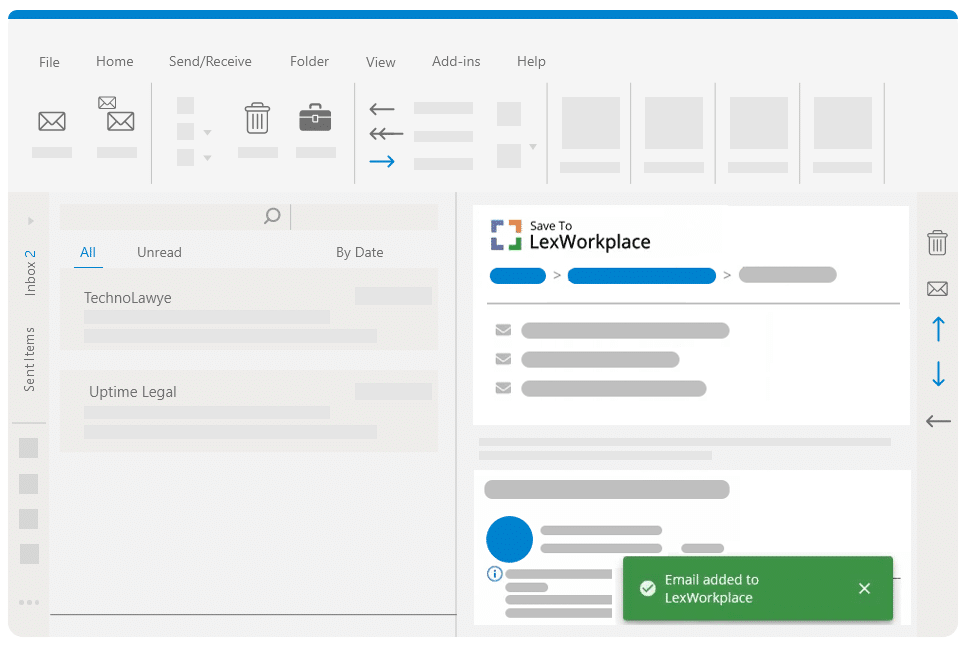
LexWorkplace enables you to save emails right to a matter file from within Outlook. These emails can then be shared, reviewed, and searched by your entire team using the simple interface.
Email messages and their attachments are then indexed and completely searchable using the built-in search engine. You’ll be able to view and open emails from inside your matter files as they’re stored right next to your documents.
LexWorkplace automatically removes duplicated emails to prevent storage overload. Plus, you can open, forward, and reply to emails from right inside LexWorkplace. It’s truly the complete package for managing your critical files and emails.
View, Store & Manage Your Emails All in One Place With LexWorkplace
Managing your firm’s emails shouldn’t be a hassle. Instead, LexWorkplace, the law firm document management system, can help you ensure your critical emails and documents are at your fingertips when you need them. To learn more about LexWorkplace, reach out to us today.
Next Steps for Law Firm Email Management
Navigating the complexities of email management in law firms requires a thoughtful approach.
To transition from understanding the challenges to implementing solutions, here’s a comprehensive guide outlining the next steps:
1
Reflect on Current Practices and Recognize the Need for Enhancement
Begin by conducting a thorough self-audit of your existing email management practices.
Evaluate the effectiveness and efficiency of your current strategies, identifying areas that require improvement. Recognize the limitations of traditional methods and understand the need for a more advanced and streamlined approach.
2
Explore Technological Solutions and Discover the Potential of LexWorkplace
Investigate the variety of available solutions, including Email Management Systems (EMS) and Document Management Systems (DMS).
Pay special attention to LexWorkplace, a cloud-based DMS designed specifically for law firms. Explore its features, benefits, and how it can address the challenges identified in your self-audit.
3
Engage with Solutions through Hands-On Experience and Gather Team Feedback
Request personalized demos or trials of potential solutions, with a focus on LexWorkplace.
Engage your team in this hands-on experience, allowing them to assess the fit, functionality, and ease of integration within your firm’s existing workflow.
Gather feedback from your team regarding usability, features, and overall effectiveness to ensure that the chosen solution aligns with the collective needs of your firm.
4
Prioritize Seamless Integration, Robust Security, and Strategic Implementation
As you narrow down your options, prioritize solutions that offer seamless integration with your current practices, robust security features to safeguard sensitive legal communications, and ease of use.
Strategically plan the implementation of your chosen solution, ensuring that the transition is smooth and that your team receives comprehensive training to fully leverage the new system.
5
Commit to Continuous Improvement, Adaptation, and Periodic Evaluation
Stay informed about updates, new features, and emerging best practices in email and document management. Commit to continuously seeking ways to enhance and adapt your processes to the evolving landscape.
Periodically evaluate the impact of the newly implemented system on your firm’s email management practices, reflecting on the improvements and considering any additional steps or adjustments needed.
By meticulously navigating these expanded steps and subtly considering the integration of a robust Document Management System like LexWorkplace, law firms can systematically elevate their email management practices.
This approach ensures a harmonious balance between efficient communication, organized document handling, and continuous improvement, leading to a more streamlined and productive legal practice.
Frequently Asked Questions - Email Management for Law Firms
Law firms often grapple with an overwhelming volume of emails, difficulty in prioritizing and categorizing messages, concerns about data security, and challenges in team collaboration and communication.
Law firms can enhance email management by prioritizing and categorizing emails, using templates for quick responses, scheduling dedicated time for email management, optimizing inboxes with rules and filters, and minimizing distractions.
An EMS helps law firms automate and streamline the process of managing emails. It can categorize, prioritize, and filter emails, ensuring that important messages are not overlooked and that data is handled securely.
LexWorkplace, a DMS designed for law firms, integrates email management with document storage, providing a unified view of all communications and case files. It offers features like secure storage, easy retrieval, and collaborative tools.
Transitioning to a DMS allows law firms to seamlessly integrate email management with document storage and collaboration, enhancing efficiency, security, and organization.
Law firms should prioritize solutions that offer robust security features, including data encryption, secure access controls, and compliance with legal industry standards to safeguard sensitive information.
To ensure a smooth transition, law firms should strategically plan the implementation, provide comprehensive training to their team, and continuously seek ways to enhance and adapt their processes to the evolving landscape.
Looking for Document Management Software?
LexWorkplace:
Modern Document Management for Law Firms
LexWorkplace is document & email management software, born in the cloud and built for law firms. Here’s a quick primer on how it works.
Organize by Client & Matter
Organize documents, email and notes by client or matter. Store and manage all data for a case or project in one place.
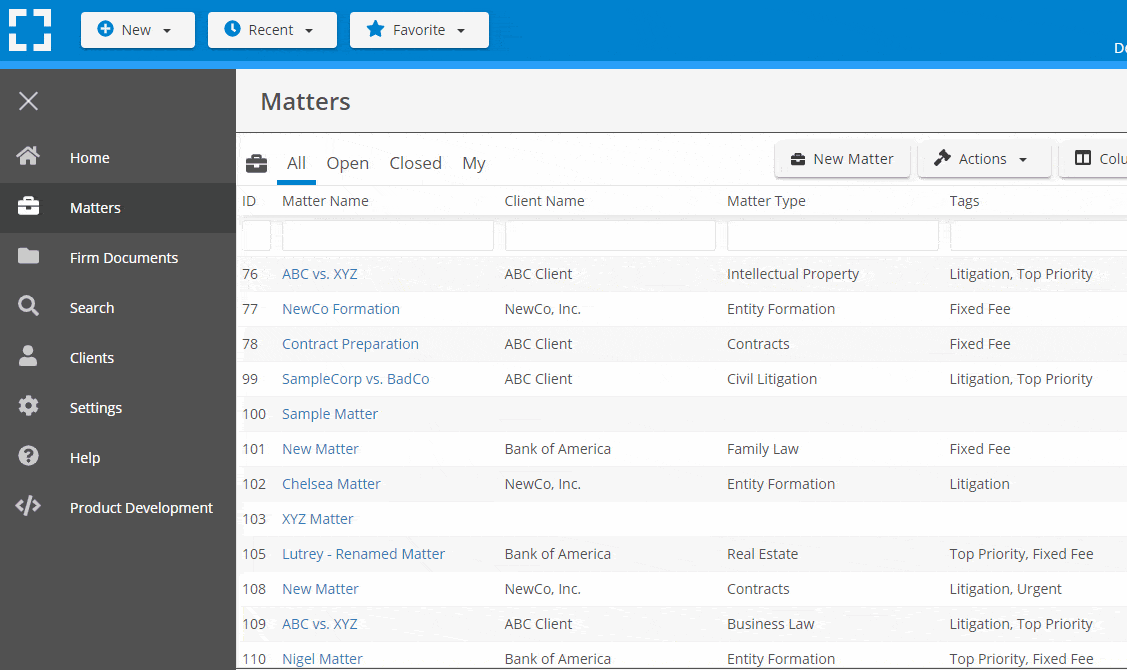
Go Beyond Basic Files & Folders
Supercharge your firm’s productivity with true DMS functions.
- Version Management
- Document Tagging & Profiling
- Document Check-Out / Check-In
- Microsoft Office Integration
- Automatic, Integrated OCR
- Convert Word Docs to PDF
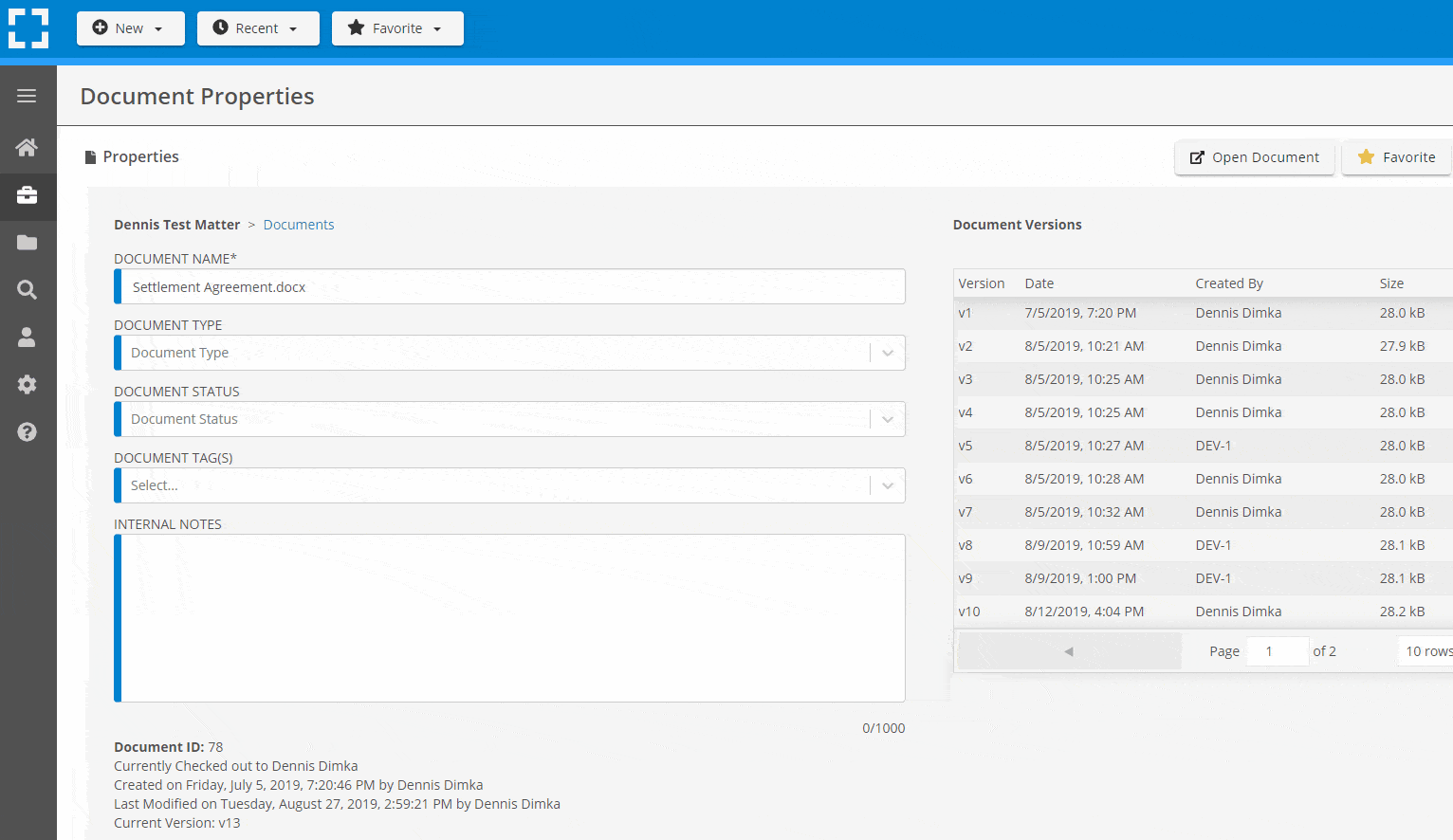
Search Everything
LexWorkplace is like Google for your law firm. Search across millions of pages, documents, folder email and notes in seconds. Refine your search by matter, document type, author and more.
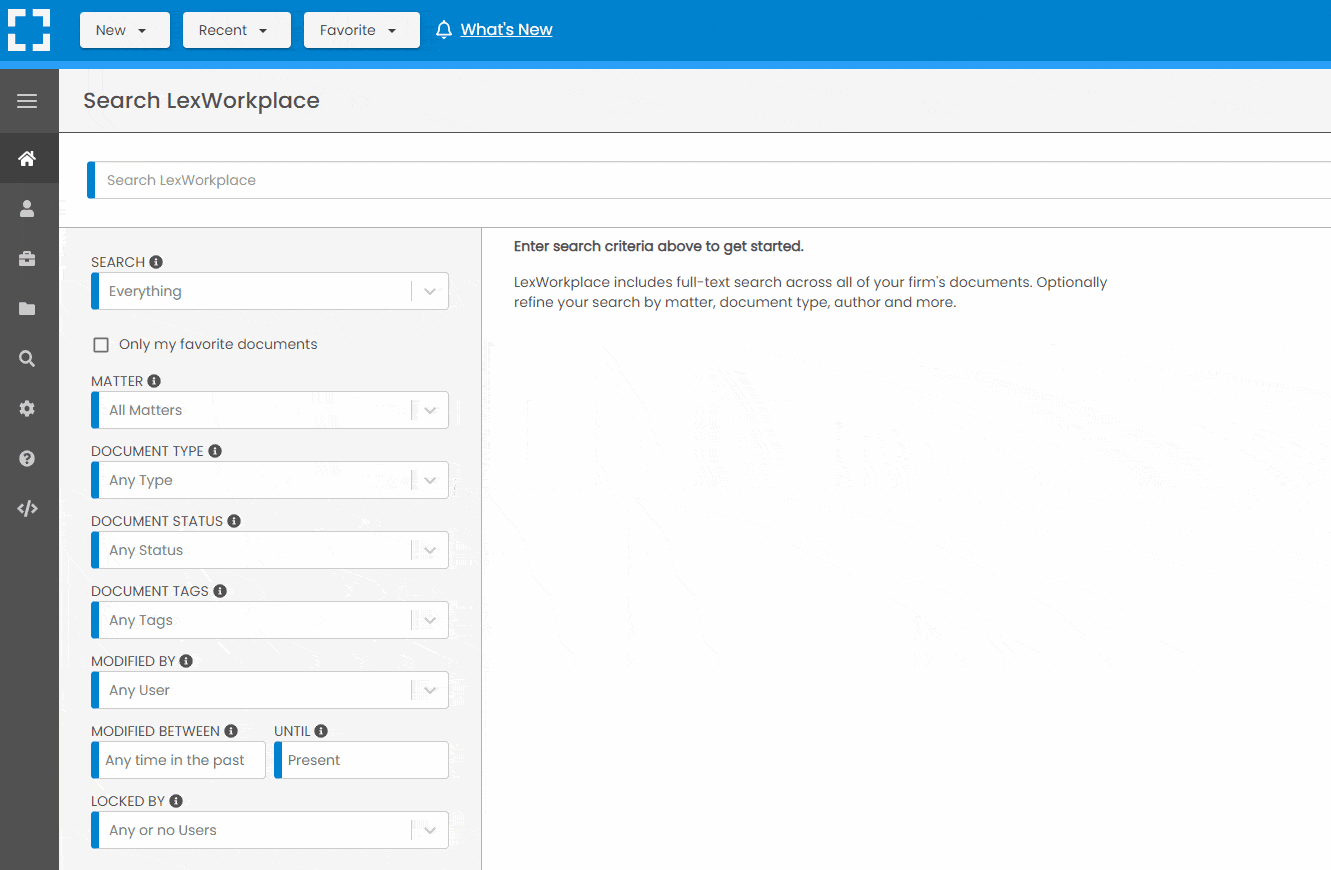
Search by…
- Client or Matter
- Document Type (Contract, Complaint, Order, etc.)
- Document Status (Draft, Final, etc.)
- Document Tags (Filed With Court, Fully Executed, etc.)
Outlook Integration + Comprehensive Email Management
Save emails to a matter without leaving Outlook. Saved emails are accessible to your entire team, organized and searchable.
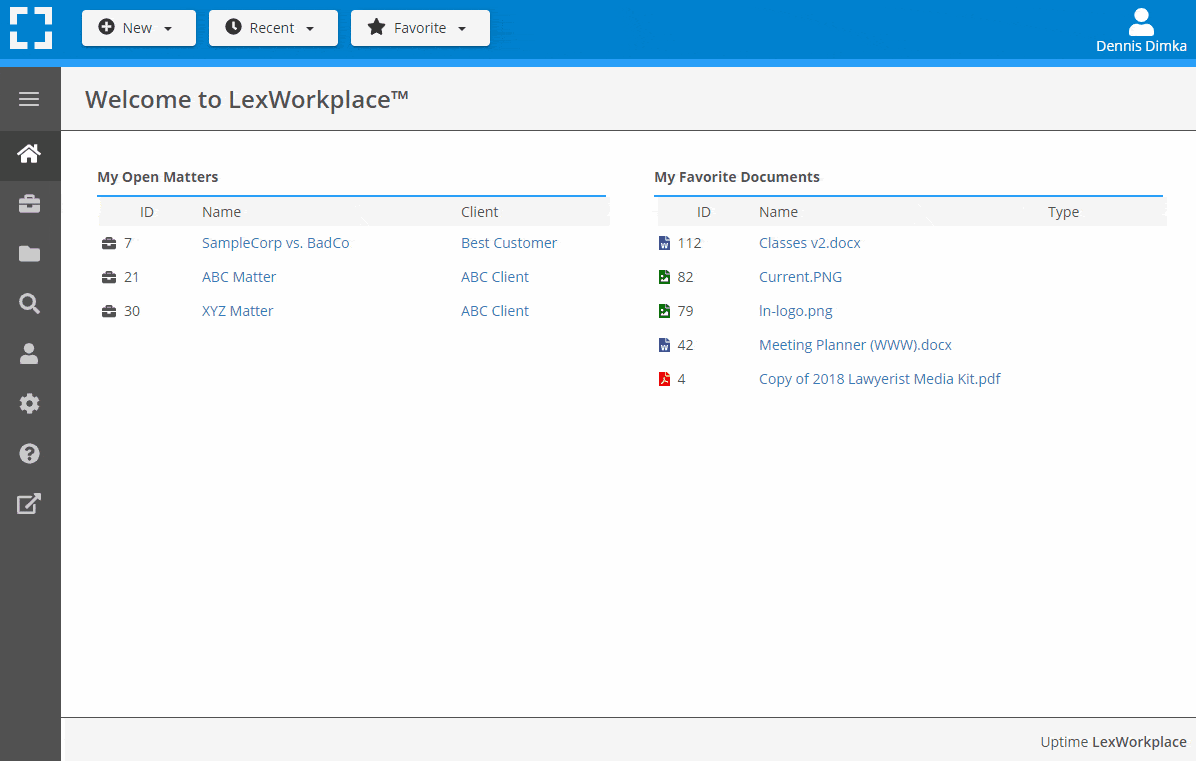
- Outlook Add-In that Works With Windows and Macs
- Save Entire, Original Email to a Matter in a LexWorkplace
- Email De-Duplication
- Organize Emails into Folders, Subfolders
Works with Windows and Macs
All of LexWorkplace is compatible with both Windows and Mac computers.
What Clients Say
Lawyers love LexWorkplace. See how the system streamlined one lawyer’s practice.
Watch the 5-Minute Demo
See LexWorkplace in action in our quick 5-minute overview and demonstration.
Or, if you want a one-on-one demo, or want to talk about LexWorkplace for your firm, schedule a call or demo below.
You Might Also Like
April 12, 2024
AI for Legal Documents: Benefits, Use Cases, and AI Tools
Discover how AI is changing legal…
August 17, 2023
12 Ways LexWorkplace Will Help Your Firm Do More With Less
Modern law firms need modern tools.…
Want More Legal Technology Tips?
Subscribe to Uptime Legal to get the latest legal tech tips and trends, delivered to your inbox weekly.
